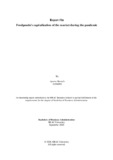| dc.contributor.advisor | Hossain, Saif | |
| dc.contributor.author | Mustafa, Apurba | |
| dc.date.accessioned | 2021-10-04T03:33:06Z | |
| dc.date.available | 2021-10-04T03:33:06Z | |
| dc.date.copyright | 2020 | |
| dc.date.issued | 2020-09 | |
| dc.identifier.other | ID 16304092 | |
| dc.identifier.uri | http://hdl.handle.net/10361/15118 | |
| dc.description | This internship report is submitted in partial fulfillment of the requirements for the degree of Bachelor of Business Administration, 2020. | en_US |
| dc.description | Cataloged from PDF version of internship report. | |
| dc.description | Includes bibliographical references (pages 30-31). | |
| dc.description.abstract | Foodpanda was first founded in Berlin, Germany. Since then they expanded their operations to 14 countries. They came to Bangladesh in 2013 via Ambareen Reza and Zubair Siddiky. Initially, they only delivered food, however, they have now expanded their operations to grocery and pharmacy.
Foodpanda’s foothold on the market is very strong because there isn’t much competition and they had a first-mover advantage. They are however quickly losing their market share through innovations of Pathao and corrective steps are yet to be taken to push back on their rivals. Their financial position may be poor but the other sectors of their business are in a respectable situation to create fierce competition. SWOT analysis reveals that their weakness and threats are very minimal or poor which means they have the ability to work towards the betterment of their company through long-term planning.
The company’s decision to diversify to grocery and pharma was a risk-averse move that allowed them to capture the three most important industries during the economic slowdown. The pandemic created a situation where Bangladesh had the ideal conditions for Foodpanda to thrive. Therefore it was not an accurate future analysis or crisis fund analysis that helped them grow at a difficult period but a unique situation that helped their cause. | en_US |
| dc.description.statementofresponsibility | Apurba Mustafa | |
| dc.format.extent | 31 pages | |
| dc.language.iso | en | en_US |
| dc.publisher | Brac University | en_US |
| dc.rights | Brac University Internship reports are protected by copyright. They may be viewed from this source for any purpose, but reproduction or distribution in any format is prohibited without written permission. | |
| dc.subject | Foodpanda | en_US |
| dc.subject | Pandemic | en_US |
| dc.subject.lcsh | Food delivery | |
| dc.title | Foodpanda's capitalization of the market during the pandemic | en_US |
| dc.type | Internship report | en_US |
| dc.contributor.department | Brac Business School, Brac University | |
| dc.description.degree | B. Business Administration | |

